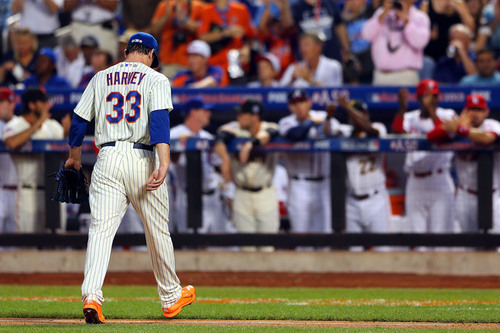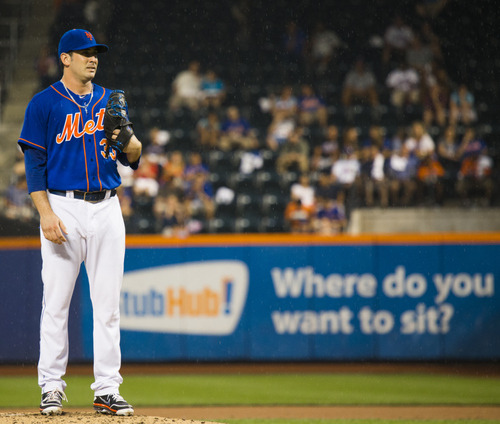#matt harvey

https://open.spotify.com/episode/3zA19VjUIkvTlwXn8KQsnh?si=p0w6_xY6ThekLWWODPjKxg
On this episode of “Giant Mess”:
- Should the Mets bring back Harvey?
- Thor tore his UCL and will need Tommy John – what does that mean for the starting rotation and for the bullpen?
- Top 5 Mets first basemen in franchise history (as ranked by MLB.com’s Anthony DiComo)
- How Coronavirus will impact MLB free agency
- How the…

Matt Harvey was supposed to be different.
I have had the misfortune of missing the best moments in Mets franchise history.
The Amazin’-ness of the ‘69 Mets came well before my time, and the ‘86 Mets managed their ridiculous season a year before I was born. By the time I became a fan, Tom Seaver was just some old guy, Nolan Ryan had faded into the Texas sun like a western hero and Dwight Gooden and Darryl Strawberry were lost to the spiral of drug addiction. Real drugs. Like the ones you take to ruin your life, not resurrect your career. You could make the argument that my birth served as some kind of Antichrist moment, a terrible turning point for the franchise. But that would be crazy. (Right?)
The bottom line is that I completely missed those players. Their time in Flushing might have been short or ended in disgrace, but generations of fans can bask in the memories that those guys created. Mine, meanwhile, revolve around a World Series loss, two epic collapses and a future Hall-of-Famer who is forever remembered for the time he didn’t swing. Oh, and Matt Harvey.
I’d be lying if I said that news of Harvey’s season-ending injury took me by surprise. The Summer of Harvey always felt like borrowed time; like I had already swallowed the poison and was just waiting for it to hit my blood stream. The Mets don’t fall ass-backwards into one of the best young pitchers in the game. They go running, arms outstretched, to guys like Paul Wilson, Bill Pulsipher and Jason Isringhausen.
The Mets don’t have a pitcher who starts his career in historic fashion. They don’t have a guy with a career ERA of 2.39 or an ERA+ of 153. They don’t have a guy who strikes out, on average, 10 batters per every nine innings. The Mets don’t have a guy who starts the All-Star Game. And they certainly don’t have a guy who can do this:
But this time, they did. The beauty of Matt Harvey was that, for once, something the Mets touched actually turned to gold. He’d been drafted by the Angels in 2007, only to spurn them for college. Then six teams bypassed him when he re-entered the draft in 2010, placing him directly in New York’s lap. And even then, we didn’t know just exactly what the Mets had. Harvey’s future was, at best as a career number two starter, or at worst a pitcher with a live fastball but no consistency.
You don’t have to squint very hard to see that Donnie Darko, alternate reality version. In one of the best drafts in the last 10 years, the Mets miss out on Bryce Harper and Manny Machado, and pass on Chris Sale and Christian Yelich to take Matt Harvey. He soon becomes the latest first-round bust, joining the likes of Billy Traber, Aaron Heilman, Phil Humber and Mike Pelfrey as modern-day Mets pitchers who never fulfilled their potential. Within five years, he’s the answer to some obscure trivia question that you’re ashamed you actually know.
Instead, without even really trying, the Mets got ahold of one of the most precious commodities in baseball.
It’s important to note here that the Mets are not to blame for anything other than being, you know, the Mets. Unlike the guy who owns the Ferrari but keeps it locked in his garage, the Mets have to turn their prospects loose at some point. These things happen for no other reason than that throwing a baseball is a stressful and unnatural action for the human body to endure time after time. It’s not overuse, and it’s not poor training. The Mets’ only mistake is that they had the audacity to try and win some baseball games.
And Harvey is not dead, nor is he even a lock for Tommy John surgery. The rational fan would say that there’s a chance he never has to go under the knife, a chance that 2014 begins with the eternal hope that spring brings to all baseball teams. But Mets fans know better. These things are never that easy.
When I sat down to write this, I turned off the TV, flipped open my laptop and turned on the most emo music still left in my iTunes library. It seemed like the appropriately melodramatic thing to do.
Yet after a song, I switched it off. I wasn’t really that upset, I realized. I had been mentally preparing for this moment all summer. I didn’t need emo music. I needed an exorcism.
—
Joe Schackman is an editor and co-founder of Began in ‘96.

The Mets’ second-year starter is one of the toughest hurlers in the league, until he hits his 100th pitch of the night.
Matt Harvey has a problem.
The Mets’ ace has dominated so far in his young career, compiling a 12-8 record and 2.26 ERA over his first 33 starts. His 161 ERA+ and 10.6 strikeouts per nine innings put him in rare company as one of the better young pitchers in history and one of the best pitchers, period, in the game today. Harvey is a threat to throw a no-hitter every time he takes the mound.
But for all the well-deserved fanfare, the 24-year-old has yet to conquer one major obstacle: the 100-pitch threshold. For no matter how good Harvey is on any given night, crossing into triple digits is near guaranteed to turn him from unhittable to downright mediocre.
So far, the Mets righty has thrown a little more than 3,290 pitches in his MLB career. About 3,100 of those came before the 100th pitch of an outing. And for the most part, those pitches have turned out very well for him. Harvey’s allowed just one run for every 72 balls thrown prior to his 100th pitch.
Yet after that 100th pitch, his performance nosedives, and it takes just 17 pitches to allow one run.
Now, the sample size is small so far. Harvey’s thrown just 192 post-100 pitches in his career, and various factors go into a hitter coming around to score. But the difference is drastic nevertheless.
Post-100 pitches this season, Harvey has faced 44 batters. They’re hitting .400, with a .533 slugging percentage and only seven strikeouts. To put that in context, fellow Cy Young contender Clayton Kershaw has faced 44 batters in that same situation and allowed just a .205 batting average against. Yu Darvish? Prior to yesterday’s near no-hitter, he’d seen 68, and they were hitting .156.
It’s not that Harvey struggles when he gets tired. That tends to happen to any athlete. It’s that he morphs into an almost completely different pitcher.
Those late-game issues have received little notice so far, largely because Harvey has been so unexpectedly great over his first 100 pitches. On a team that’s overachieved and yet still sits eight games below .500, any outing that keeps the Mets in the game past the sixth inning is considered a good one.
But as New York takes its next steps forward, they will increasingly need Harvey to finish out his starts on a strong note. He’s the ace, and therefore the de facto stopper. He’ll be relied on to throw effectively deep into games on those occasions the Mets desperately need a big win or some extra rest for their bullpen.
The Mets realize that, and appear to already be trying to improve Harvey’s late-game performance. Pitching coach Dan Warthen before Harvey’s Aug. 7 start against the Rockies challenged him to “pitch at 80% and try to get into the ninth inning with 90 pitches,” the New York Daily News’ Andy Martino reported.
Harvey responded with 8⅔ shutout innings, allowing just three hits. With one out to go, he released his 100th pitch of the game. Charlie Blackmon volleyed it right back at him, sending it screaming off Harvey’s knee cap and into right field. It was one of the hardest-hit balls he’d allowed all game, and his latest post-100 test.
Harvey returned to the mound. Six pitches later, he’d retired Troy Tulowitzki and hit 98 mph in the process. It was his first career complete game.
Whether that’s the turning point, we won’t know for a while. But it’s certainly a sign that Harvey and his coaches are working hard to string out his abilities over a longer period. At 24 and with less than a full year under his belt, he’s got plenty of time to fix the flaw preventing an already-great pitcher from becoming a perennial Cy Young candidate.
As far as problems go, that’s not a bad one.
–
Joe Schackman is an editor and co-founder of Began in ‘96.

